Difference between revisions of "Metalshop Area"
| Line 88: | Line 88: | ||
'''Compressed Gas Cylinders''' | '''Compressed Gas Cylinders''' | ||
| − | #Argon and CO2 are inert, nontoxic gases normally present in the atmosphere. However, if allowed to fill an enclosed area these gases can fully displace breathable air, causing asphyxiation and death. Greater potential danger is the valve being knocked off the cylinder, turning it into a rocket powerful enough to severely injury or kill people and damage equipment and the building itself. | + | #Argon and CO2 are inert, nontoxic gases normally present in the atmosphere. However, if allowed to fill an enclosed area these gases can fully displace breathable air, causing asphyxiation and death. Greater potential danger is the valve being knocked off the cylinder, turning it into a [https://www.google.com/url?sa=t&rct=j&q=&esrc=s&source=web&cd=1&cad=rja&uact=8&ved=0ahUKEwjgoben1NTJAhVxtoMKHcOUD3EQyCkIHjAA&url=https%3A%2F%2Fwww.youtube.com%2Fwatch%3Fv%3DejEJGNLTo84&usg=AFQjCNHsmc_7cnerbQoLrdAHYLgzwssOnQ&bvm=bv.109910813,d.eWE rocket] powerful enough to severely injury or kill people and damage equipment and the building itself. |
#The following guidelines must be followed at all times: | #The following guidelines must be followed at all times: | ||
#*'''''Storing''''' | #*'''''Storing''''' | ||
Revision as of 14:36, 11 December 2015
Contents
General Information
MakeICT's metal shop is an open 1236 sq ft area dedicated to metal working with shared space for bicycle repair.
Gavin Rondeau is the Benevolent Dictator over the metal shop.
Machine Access Policy
Iron working tools are hazardous. Before anyone may use the tools, they need to attend a shop safety class and be approved for tool use. We want everyone to go home safe and in one piece! SAFE OPERATION of tools is top priority.
While not required, we strongly suggest that anyone who wishes to work in the metal shop has a tetanus vaccination. We only get one life and one body to destroy, poisoning from rusty metal is a bad way to go.
We strongly suggest that while tools are in operation, anyone entering the shop use personal protective equipment (PPE) such as safety glasses, hearing protection, and hand protection.
It is HIGHLY recommended that we use a buddy system, where no single person is working in the shop without a second person in the building so that if there is an injury, somebody else is there to call for help or assist you.
General Shop Safety
- Do not use any machine you are not comfortable using. If at any time you are unsure of what you are doing, stop immediately and ask for help.
- Do not use any machine that is not in good working order. Stop, unplug and leave a note on the machine and notify the metal shop BD.
- NEVER ASSUME A TOOL IS PROPERLY ADJUSTED. Always check the tool prior to use.
- Wear safety glasses at all times when tools are in use in the shop area.
- Ear protection is also recommended, many of the tools operate above 90 decibels and without protection, you are losing hearing.
- When working in metal shop:
- No open-toed shoes or loose clothing (remove drawstrings)
- Remove objects on hands and wrists (including rings, bracelets, & watches)
- Remove dangly necklaces, hair ornaments, and earrings
- Restrain long hair to prevent entanglement
- Do not leave machines running unattended.
- Never talk to or disturb anyone operating power tools, forge or welding equipment. If you must talk to an operator wait until the operator finished the operation.
- Be aware of the work going on around you. Do not accidentally bump into another person or their materials while they are working. Don't forget you can be harmed by the actions of those around you in the metal shop.
- Most shop accidents are caused by working tired, rushed or distracted. As you get more experience, you will learn to listen to the little voice in the back of your mind that says, you probably shouldn't do that. Stop and think, there is usually a safer way of performing that function. These machines do not have a brain, please use yours!
Metal shop Safety
- Smoke is not always a bad sign in the metal shop, but you need to be aware of the situation you are in. Smoke is a hazard to your health, so when doing operations that cause smoke, please try to limit it and have proper ventilation.
- No wet or damp items of any type (including drink containers, rags, or hands) may be placed or left on machine surfaces as they will corrode.
- Do not lean or sit on machinery.
- You are responsible for cleaning your machines, your work space, and putting all tools away after use. Scrap metal should be placed in designated locations. Use vacuums or hand brushes to clean machinery.
- Users who consistently fail in their clean-up responsibilities may be denied shop access.
- Make sure machines are in the “off” position and motion has stopped, before leaving them after use.
- Make sure alll cylinders are in the off position while not in use.
- All safety guards must be kept in place while operating equipment. If a guard or safety device is an impediment to safe operation of a machine - ask for help.
- Use equipment only for its intended use.
- If you have made an adjustment to a piece of equipment, return it to its normal position after you are done.
- Make sure the machine’s work surface is unobstructed and clean before use.
- Always be aware of the proximity of moving machine parts to body parts - fingers.
- Metal can be hot even though it doesn't look like it, beware of burns.
- Metal is heavy and can cause injury if falling.
- All guests are the responsibility of the member, guests are not allowed to use equipment. This is a working shop, so children less than 7 years old are not allowed for safety.
Machine shop Specific Safety
- Due to the high level of technical understanding and cost of the Tormach, there will be extensive training required before use.
- All work shall be secured properly and all loose objects removed from tables before machines are operated.
- Cut off wheels that have any damage need to be disposed of and replaced with one that is not damaged.
- Milling cutters and other hardened tools shall not be struck with steel hammer. Blocks of wood, rawhide, or copper hammers should be used.
- Proper feeds and speeds shall be selected before operations are started.
- Machines shall be stopped before any attempts are made to measure or to check work.
- Guards and baffles shall be used to protect others from flying chips, oil or coolants.
- Most all equipment has pinch point or crushing areas that you need to be familiar with before using that equipment.
Welding shop Specific Safety
- Member is responsible for using welding curtains (when complete) to protect other people in area from weld flash hazards.
- ALWAYS wear a proper face shield when grinding and a welding helmet when welding.
- ALWAYS wear close-toed shoes, no excuses!
- It will make you more comfortable to wear a long-sleeved, non-flammable shirt such as a welding jacket while welding.
- Wear the appropriate glove while welding.
- We suggest you wear ear protection (earplugs or muffs) to prevent sparks from entering your ear canal. An eardrum punctured by a spark will instantly cauterize and never heal.
Fumes
- NEVER weld on or near anything that's been cleaned with a chlorinated hydrocarbon like brake-cleaner. When combined with UV light, chlorinated hydrocarbons can create phosgene gas, which can cause serious injury or death. Ventilation will not prevent poisoning.
- No galvanized (zinc plated) material should be welded without removal of the galvanized coating near the weld zone to protect from poison gas release.
Welding Fumes and Gases Fact Sheet
Fire
- Make sure the weld area is free from all flammable materials such as flammable liquids, paper, etc. Do not wear clothing or gloves that have been exposed to flammable liquids.
Electrocution
- Before turning on a welding machine, make sure there are no puddles of water on the floor around the weld bench or the machine. Make sure the weld machine is dry, including the main box, the torch and the plug.
- There is little risk of fatal electrocution from a properly working MIG weld machine.
Burns
- Welded metal will remain hot for several minutes after it is welded and will not be obvious of the heat retained. In most cases the heat is localized near the weld itself but you cannot tell by looking.
- MIG welding steel will create sparks, so earplugs and full coverage safety glasses should be worn to prevent burns to sensitive tissue.
- Gloves must be worn when welding and handling recently welded material. Deerskin or heavy-duty insulated welding gloves give the best protection, but you can choose the glove that is right for you.
- If you burn yourself, immediately cool the wound, seconds count! We will keep burn cream in the fridge, apply asap! Burns will happen, just a part of metal working.
UV Burns
- The light emitted from a weld arc is brighter than that of the sun. Do not look at the arc without wearing a full-faced welding mask with a shade 9 or darker filter plate. Always make sure the weld curtains are in place between the welder(s) and other people in the shop. You will be more comfortable if you cover any exposed skin, including cuff and collar areas, while welding or observing inside the weld area. The rays from the arc can cause a UV burn much worse than a sunburn.
Compressed Gas Cylinders
- Argon and CO2 are inert, nontoxic gases normally present in the atmosphere. However, if allowed to fill an enclosed area these gases can fully displace breathable air, causing asphyxiation and death. Greater potential danger is the valve being knocked off the cylinder, turning it into a rocket powerful enough to severely injury or kill people and damage equipment and the building itself.
- The following guidelines must be followed at all times:
- Storing
- Cylinders must ALWAYS remain upright and NEVER be placed horizontally.
- Cylinders must be secured with a non-combustible material (metal) to an immovable object to prevent them from falling.
- Moving
- Cylinders must be securely capped.
- Storing
Equipment List
| Picture | What | Manufacturer | Model | Power | Status | Expert | How To |
|---|---|---|---|---|---|---|---|
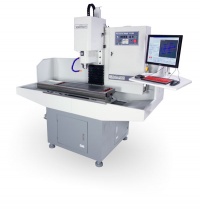 |
4 Axis 34" x 9.5" CNC Mill | Tormach | PCNC 1100 | 220 | Working | Curt Gridley | [manual] |
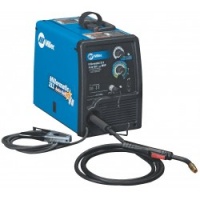 |
MIG Autoset Welder | Miller | Millermatic 211 Autoset | 220 | Working | Jeff Eck | File:Miller211 manual.pdf |
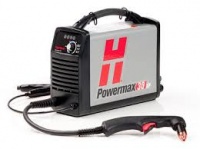 |
Plasma Cutter | Hypertherm | 30 XP | 220 | Working | Jeff Eck | File:Hypertherm30XP manual.pdf |
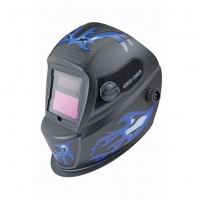 |
Welding Helmet | Chicago Electric | 91214 | solar | Working | Gavin Rondeau | File:WELDING HELMET.pdf |
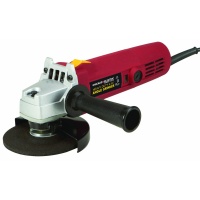 |
4.5" Angle Grinder | Chicago Electric | 91223 | 110 | Working | Gavin Rondeau | File:ANGLE GRINDER.pdf |
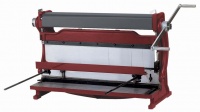 |
Combo Shear/Brake/Roller | Central Machinery | 5907 | Working | Working | Gavin Rondeau | |
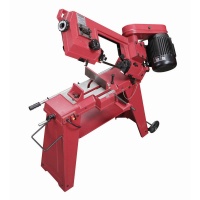 |
Horizontal/Vertical Metal Cutting Band Saw | Central Machinery | 93762 | 110 | Working | Gavin Rondeau | File:LAYDOWN BANDSAW.pdf |
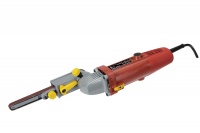 |
1/2" Bandfile Belt Sander | Chicago Electric | 92158 | 110 | Working | Gavin Rondeau | File:BANDFILE.pdf |
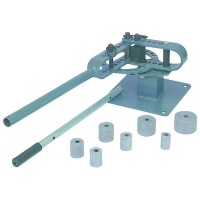 |
Bar and Rod Bender | Central Machinery | 38471 | Elbow grease | To Setup | Gavin Rondeau | File:BAR AND ROD BENDER.pdf |
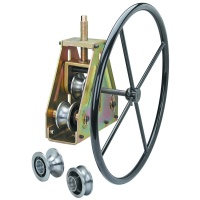 |
Tubing Roller | Pittsburgh | 99736 | Working | Setup | Gavin Rondeau | File:99736 tube roller manual.pdf |
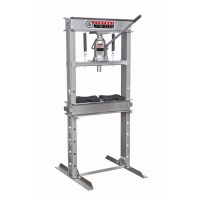 |
20 Ton Hydraulic Press | Central Machinery | 20 Ton | Working | Setup | Gavin Rondeau | |
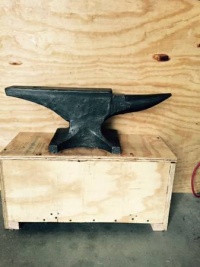 |
Anvil | Trenton | Made in 1900 | On the Stump | Setup | Gavin Rondeau |